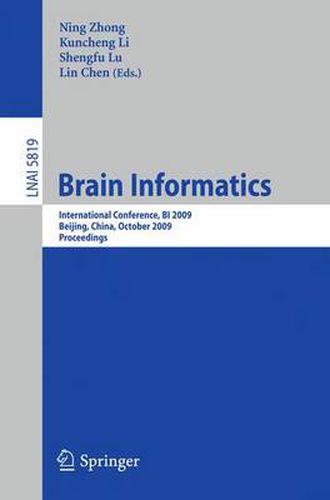Readings Newsletter
Become a Readings Member to make your shopping experience even easier.
Sign in or sign up for free!
You’re not far away from qualifying for FREE standard shipping within Australia
You’ve qualified for FREE standard shipping within Australia
The cart is loading…






This title is printed to order. This book may have been self-published. If so, we cannot guarantee the quality of the content. In the main most books will have gone through the editing process however some may not. We therefore suggest that you be aware of this before ordering this book. If in doubt check either the author or publisher’s details as we are unable to accept any returns unless they are faulty. Please contact us if you have any questions.
This volume contains the papers selected for presentation at The 2009 Inter- tional Conference on Brain Informatics (BI 2009) held at Beijing University of Technology, China, on October 22-24, 2009. It was organized by the Web Int- ligence Consortium (WIC) and IEEE Computational Intelligence Society Task Force on Brain Informatics (IEEE TF-BI). The conference was held jointly with The 2009 International Conference on Active Media Technology (AMT 2009). Brain informatics (BI) has emergedas an interdisciplinaryresearch?eld that focuses on studying the mechanisms underlying the human information proce- ing system (HIPS). It investigates the essential functions of the brain, ranging from perception to thinking, and encompassing such areas as multi-perception, attention,memory,language,computation,heuristicsearch,reasoning,planning, decision-making, problem-solving, learning, discovery, and creativity. The goal of BI is to develop and demonstrate a systematic approach to achieving an integrated understanding of both macroscopic and microscopic level working principles of the brain, by means of experimental, computational, and cognitive neuroscience studies, as well as utilizing advanced Web Intelligence (WI) centric information technologies. BI represents a potentially revolutionary shift in the way that research is undertaken. It attempts to capture new forms of c- laborative and interdisciplinary work. Following this vision, new kinds of BI methods and global research communities will emerge, through infrastructure on the wisdom Web and knowledge grids that enables high speed and d- tributed, large-scale analysis and computations, and radically new ways of sh- ing data/knowledge.
$9.00 standard shipping within Australia
FREE standard shipping within Australia for orders over $100.00
Express & International shipping calculated at checkout
This title is printed to order. This book may have been self-published. If so, we cannot guarantee the quality of the content. In the main most books will have gone through the editing process however some may not. We therefore suggest that you be aware of this before ordering this book. If in doubt check either the author or publisher’s details as we are unable to accept any returns unless they are faulty. Please contact us if you have any questions.
This volume contains the papers selected for presentation at The 2009 Inter- tional Conference on Brain Informatics (BI 2009) held at Beijing University of Technology, China, on October 22-24, 2009. It was organized by the Web Int- ligence Consortium (WIC) and IEEE Computational Intelligence Society Task Force on Brain Informatics (IEEE TF-BI). The conference was held jointly with The 2009 International Conference on Active Media Technology (AMT 2009). Brain informatics (BI) has emergedas an interdisciplinaryresearch?eld that focuses on studying the mechanisms underlying the human information proce- ing system (HIPS). It investigates the essential functions of the brain, ranging from perception to thinking, and encompassing such areas as multi-perception, attention,memory,language,computation,heuristicsearch,reasoning,planning, decision-making, problem-solving, learning, discovery, and creativity. The goal of BI is to develop and demonstrate a systematic approach to achieving an integrated understanding of both macroscopic and microscopic level working principles of the brain, by means of experimental, computational, and cognitive neuroscience studies, as well as utilizing advanced Web Intelligence (WI) centric information technologies. BI represents a potentially revolutionary shift in the way that research is undertaken. It attempts to capture new forms of c- laborative and interdisciplinary work. Following this vision, new kinds of BI methods and global research communities will emerge, through infrastructure on the wisdom Web and knowledge grids that enables high speed and d- tributed, large-scale analysis and computations, and radically new ways of sh- ing data/knowledge.